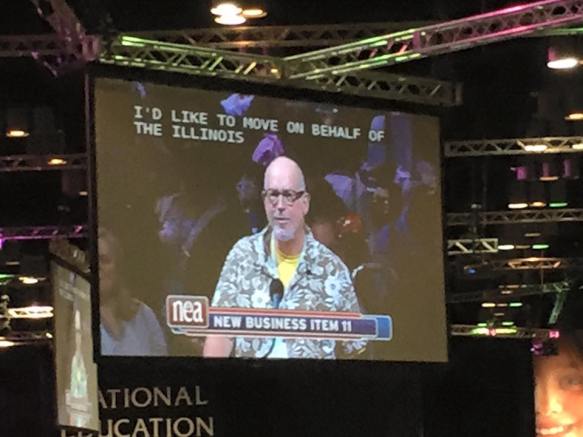Guest Blog: The NEA Will Seize this Moment to Demand an End to Institutional Racism
This week, NEA’s Representative Assembly took an important step to address the scourge of racism in America. RA delegates approved a new business initiative calling for redoubled efforts to end the barriers that stand between our nation’s students and their opportunities to realize their full potential. NEA Executive Committee member, Dr. Kevin Gilbert, shared a poignant reflection in support of the passage of the NBI to address institutional racism. Dr. Gilbert’s words express our collective hopes and dreams for the future of our children and our nation. NEA and its leadership stand united in support of social justice issues and this critical new business item.
Lily Eskelsen García, NEA President @Lily_NEABecky Pringle, Vice President @BeckyPringlePrincess R. Moss, Secretary-Treasurer @PrincessRMossJohn C. Stocks, Executive Director @johnstocksGreg Johnson, NEA Executive Committee @GregJohnsonNEAMaury Koffman, NEA Executive Committee @Maury_KoffmanJoyce Powell, NEA Executive Committee @joycepowell_NEAGeorge Sheridan, NEA Executive CommitteeEarl Wiman, NEA Executive Committee
The NEA Will Seize this Moment to Demand an End to Institutional Racism
There are few moments in history when circumstances provide the opportunity to create meaningful change in our society. When opportunities present themselves, those with the will and desire must seize the moment. We were all shocked by the senseless act of violence committed against nine innocent citizens of this country. The crime was committed by a man who had hate in his heart—a man whose destiny was to force the nation to again consider its ugly racial past and its future where the humanity and dignity of persons is yet to be fully realized. In this respect, June 17, 2015, will be forever etched in the nation’s collective memory. For me, though, the next day, June 18, was just as significant. I drove my nine-year-old son to our church summer ministry program, and as we listened to news commentators try to make sense of what happened the previous day. My son, in turn, asked me questions that I could not fully answer, questions that broke my heart:
“Dad, why did he do that?”
“Dad, why does he hate black people?”
“Dad, will he be forgiven?”
After dropping him off at our church, my mind went back to one of the most vivid memories I have from my youth. In the 1970’s, on a visit with my grandparents in Mississippi, we were awakened in the middle of the night and rushed outside of the house because someone had thrown a Molotov cocktail through the window of my grandparents’ bedroom. I later found out that there were some people in the area that were not happy with the fact that my grandparents were living in “their” neighborhood. I had questions. And my dad did for me what I would have to do for my son thirty-nine years later.
My father had the same conversation with me that his father had with him when he was selected as one of a group of African American students to integrate the local all-white high school in the mid 60’s. My son has questions. I have questions. My father had questions. The cycle to rationalize the irrational seems, then, to never end. And yet, we can’t allow the irrational to overwhelm progress. We must remain diligent in our responses to racial tragedy. The range of events, from the death of Travon Martin, to the murder of the Mother Emmanuel Nine as the victims of the Charleston tragedy are now being called, has raised the consciousness of our nation, and now it is time to act.
Today, epitomizes the leadership’s capacity for excellence when “the members of the National Education Association acknowledge the existence in our country of institutional racism—the societal patterns and practices that have the net effect of imposing oppressive conditions and denying rights, opportunity, and equity based on race … and the manifestation of institutional racism in our schools and in the conditions our students face in their communities …”
Today, the delegates at the NEA Representative Assembly spoke loudly and said “ENOUGH IS ENOUGH!!” The time has come for us to “use our collective voice to bring to light and demand change to polices, programs, and practices that condone or ignore unequal treatment and hinder student success.” We will equip NEA members and our national, state, and local leaders with the skills necessary to have these courageous conversations and advocate purposefully. We will create space for NEA Will Seize this Moment to Demand an End to Institutional Racism:













